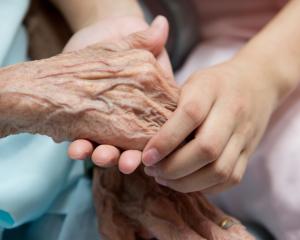Demand for colonoscopies could put the national bowel screening programme at risk if participants were given full test results, the National Screening Advisory Committee says.
Documents released under the Official Information Act show the committee has backed off ethical concerns it raised in 2015.
Then, it expressed ''substantial'' concerns about plans to report only initial faecal blood results to general practitioners as either positive or negative, according to the national programme's test threshold.
Its concern arose because the test threshold to trigger referral to a colonoscopy in the national programme is less sensitive than that used for the Waitemata District Health Board pilot programme.*
''This approach means there will be a group of people with a now known elevated risk, but with the GP and the patient not being aware of this information,'' the then committee chairman Prof Ross Lawrenson said in a letter to the screening programme.
''Committee members questioned the ethics of withholding full information, given people have consented to being screened, and the information is materially important,'' he wrote.
The committee considered a better approach was to provide the actual measurement so the GP could discuss what it may mean with a patient, creating the opportunity for future action, such as being alert to or acting on symptoms.
But in a letter written to the programme in late April this year, and released under the OIA, the committee, now chaired by Dr Joanne Dixon, after considering information provided by the screening programme, accepted the programme stance on not reporting the actual blood content.
Results of the initial faecal immunochemical test (FIT) which participants will complete at home and mail to a laboratory for testing , will be reported as either positive or negative according to the blood/buffer level set by the programme.
Ethics were not mentioned in the letter, but Dr Dixon said while knowledge that a FIT result close to the threshold might generate a higher index of suspicion for patients, the resulting demand on colonoscopy services, particularly for this asymptomatic sub-group, would overwhelm capacity and put the entire screening programme at risk.
The committee appreciated the rigorous approach the programme had taken to identify the most appropriate threshold for the programme and that this process aligned with other centrally managed international programmes in which thresholds were selected following consideration of pilot results and colonoscopy capacity, Dr Dixon wrote.
The programme told the committee in June last year that forwarding the actual test results to GPs would depart from standard international practice. (Waitemata pilot participants were not issued with actual readings.)
What does not appear to have been addressed by the programme or international authorities it approached for advice on the results reporting issue is that participants in the screening programme will have the right, under New Zealand's health information privacy code, to seek the actual reading after screening.
Asked whether participants would be advised of this right, the programme's only response was to say that as with all personal health information under the code, patients had the right to access their own health information. Information on the code was widely available and a link was provided on the ministry website.
One of the international screening authorities asked for advice about the results reporting, Prof Stephen Halloran, of the UK, who gave advice to the Ministry of Health on the pilot programme, said the decision not to give actual results was the right one.
The provision of numeric FIT data to the participants would need to be accompanied by a wealth of detailed supporting interpretive data and caveats and ''I suspect it would still mislead''.
On the basis all screening programmes did harm, ''including anxiety; reporting a FIT result might do more harm by increasing anxiety''.
Faecal blood tests were screens for risk. They did not attempt diagnosis, but provided population-based outcomes which ''we then apply to individuals''.
This meant at the same concentration, risks would be very different between men and women, between 60-year-olds and 74-year-olds, in those in different socioeconomic groups and particularly between individuals with different screening histories.
''Personalised screening is our goal and hopefully we will be able to move in this direction with the adoption of evidence based FIT risk scores but that is for the future.''
*The Waitemata DHB pilot programme set the level of blood detected which would trigger further investigation at 75ng haemoglobin/ml buffer but the new national threshold is 200ng Hb/ml buffer.
Figures sought from the screening programme show in the first two-year screening round of the pilot, 33 people who returned readings between the pilot level of 75ng Hb/ml and the less sensitive 200ng Hb/ml were found to have cancer. This was about 15.4% of the total number of cancers found in that round.
Of the 29 cancers where the stage of cancer was known, eight of them were at the more serious end (stages 3 and 4) and 21 of them were stage 1 or 2, considered early-stage cancers.
On privacy grounds, the programme refused to release details which would show the actual readings at which each of the 33 cancers were found. It did say, however, that 13 of the cancers (almost 40% of the 33 cancers) were found at the lower end of the readings, in the 75-99ng range.











